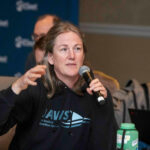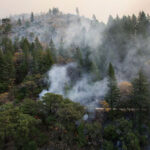From battery technologies to biofuels innovations, many technology inventions prove of great value to industry. But did you know that Lab-developed software is also highly sought after by some industry sectors? For example, Phenix software, which had its start in the late 1990s in Paul Adams’ lab in the Biosciences Area, solves the 3D structures […]
News
Model Context Protocol: An AI Tool for Seamless Access to Data, Scientific Resources
ScienceIT offers AI tools and services for Lab researchers under the CBorg AI Portal, providing Berkeley Lab staff with access to selected AI models that can perform a multitude of tasks. Many researchers have taken advantage of these offerings with creative applications and using new tools. One of the tools that researchers are finding […]
The DOE Joint Genome Institute: Reinventing Itself as an AI-Centric User Facility
“AI is data hungry.” – Kjiersten Fagnan, CIO of the Joint Genome Institute As a U.S. Department of Energy Office of Science user facility supported by the Biological and Environmental Research (BER) program, the Joint Genome Institute (JGI) leads genomic innovation for advancing biotechnology through its high-throughput sequencing, DNA design and synthesis, metabolomics, and computational […]
Evacuating in Case of Fire
Scenario A: There’s a fire raging in Oakland, and it’s headed towards the Berkeley Lab main site. You’ve received a LabAlert on your phone or email to evacuate the Lab. Scenario B: There’s a nearby building fire in Emeryville and you’ve received an order to evacuate your building in EmeryStation East. Scenario C: The fire […]
K-12 Office Helps Build Tomorrow’s AI/ML Workforce
Artificial intelligence (AI) and machine learning (ML) are critical skills for today’s and tomorrow’s scientists. So much so that the White House recently announced a presidential action in support of AI education for American youth. The Department of Energy is also focused on building an AI-ready workforce. At Berkeley Lab, the K-12 team has already […]
SPO Reminder: Research Partner, Sponsor, and Donor Representations and Certifications Requirement
The Department of Energy (DOE) mandates that all sponsors and donors undergo re-certification every two years. Berkeley Lab uses the Representations and Certifications form to accurately capture the profiles of organizations interested in or pursuing research projects with the Lab. The information on the form is crucial for fulfilling DOE contractual requirements. It provides information […]
What You Should Know About Philanthropy at the Lab
While most of the Lab’s research funding comes from federal resources, philanthropy has long played a role in funding priority projects at the Lab. Two entities at the Lab help facilitate this process, the Office of the Chief Development Officer (OCDO) and the Berkeley Lab Foundation (BLF). The OCDO works collaboratively with Berkeley Lab staff […]
Accelerating Quantum Computing through Collaborations with Industry
Quantum computing is a large-scale challenge that requires the contributions of all sectors — government agencies, research institutions, and the private sector. At Berkeley Lab, quantum computing researchers are collaborating with partners around the world to advance the field. For example, the Quantum Systems Accelerator (QSA) is a DOE National Quantum Information Science Research Center […]
Streamlined Process for International Shipping Requests – Effective March 1, 2025
To improve efficiency in handling international shipping requests for non-biological items, the Export Compliance Office is transitioning to a new submission process using Jira, a project management tool. Starting March 1, 2025, all international shipping requests for non-biological items must be submitted through the Export Control website using this link: https://exportcontrol.lbl.gov/forms/ (select “Non-Biological International Shipping […]
LDRD Program Announces FY25 Projects
Our Laboratory Directed Research and Development (LDRD) program serves as a proving ground for innovative concepts, providing seed funding for selected high-risk, high-reward research ideas. It attracts promising young scientists and engineers and encourages them to pursue new approaches to problems. For the FY25 cycle, the LDRD Call for Proposals cycle received a total response of 157 submissions. […]
Was this page useful?









